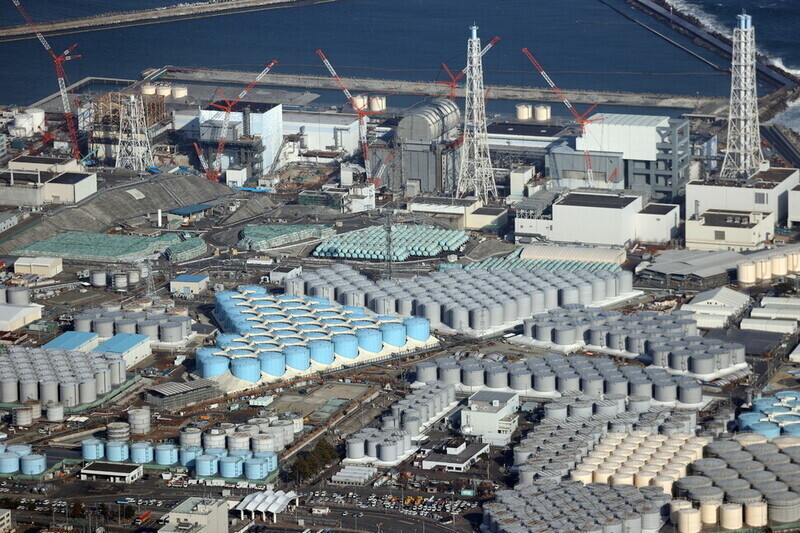hankyoreh
Links to other country sites 다른 나라 사이트 링크
Solar power to become cheaper than nuclear power by 2030, Japanese government says

Solar power, an eco-friendly and renewable source of energy, could overtake nuclear power to become the cheapest form of energy by 2030, the Japanese government has said.
Observers call it the first example of government predictions parting ways with the traditional assumption in energy policy — namely that renewable energy sources are expensive, while nuclear energy is relatively inexpensive.
The Asahi Shimbun newspaper Tuesday quoted the Japanese Ministry of Economy, Trade and Industry as having announced estimates the day before putting the cost of solar-powered energy — for commercial purposes — at between 8 and 12 yen per kilowatt-hour by 2030, making it less expensive than nuclear power — between 11.5 and 12 yen per kilowatt-hour.
The Japanese government’s estimates of the costs of nuclear power have been consistently rising.
In a 2011 prediction, it estimated that the cost would be 8.9 yen/kWh by 2030. That estimate was raised to 10.3 yen/kWh in 2015, and again to nearly 12 yen in the latest announcement.
While nuclear power has long been perceived as the least expensive energy source, it is expected to slip to fourth place in terms of minimum estimates, as it falls behind onshore wind power (9–17 yen) and liquefied natural gas (LNG, 10–14 yen) as well.
Factors behind the rise in nuclear power costs include associated safety measures and waste disposal. Increased regulation in the wake of the 2011 Fukushima Nuclear Power Plant disaster has necessitated construction efforts for measures such as containment of the spread of radioactive materials, while the costs of compensation and decommissioning in the event of a disaster have also risen.
Other factors cited as driving up costs include reprocessing of spent nuclear fuel and radioactive waste disposal.
In contrast, the ministry predicted the total costs of solar power generation would gradually drop thanks to technological innovations and mass adoption. According to its calculations, they are poised to fall from nearly 13 yen/kWh in 2020 to the range of “8–12 yen/kWh” ten years later in 2030.
The cost calculations were arrived at by dividing the amount of money spent to build power generation facilities, and to continue operating them for a sufficient period of time until their closure, by the total amount of power generated.
“Even after the Fukushima Nuclear Power Plant accident, the Japanese government and Tokyo Electric Power Company have continued to emphasize the superiority of nuclear power in terms of costs, but now that assumption is being called into question,” the Asahi Shimbun wrote, adding that the estimates would have an “inevitable impact on energy policy.”
Japan plans to vastly expand its use of solar and wind power and other renewable energy, developing them into “mainstay energy sources.”
But it also continues to increase its reliance on nuclear power, citing the limitations of solar power in terms of being unable to produce energy at night and wind power in terms of being influenced by weather conditions.
The Japanese government has also resumed the operation of nuclear power plants, overturning a previous policy decision to shut all of them down in the wake of the 2011 Fukushima disaster. It plans to increase the percentage of all electricity production from nuclear power from its current level of roughly 6% to 20–22% by 2030.
In an interview with the Asahi Shimbun, Kenichi Oshima, a professor of environment economics at Ryukoku University, said the government’s announcement “eliminates the basis for claiming that nuclear power is economically superior.”
The Mainichi Shimbun newspaper wrote that while the government and power companies had been “citing inexpensive costs as a basis for pursuing nuclear power generation,” the announcement means the “‘nuclear power myth’ has now collapsed not just in terms of safety but also in terms of cost.”
By Kim So-youn, staff reporter
Please direct comments or questions to [english@hani.co.kr]

Editorial・opinion
![[Column] Park Geun-hye déjà vu in Yoon Suk-yeol [Column] Park Geun-hye déjà vu in Yoon Suk-yeol](https://flexible.img.hani.co.kr/flexible/normal/500/300/imgdb/original/2024/0424/651713945113788.jpg) [Column] Park Geun-hye déjà vu in Yoon Suk-yeol
[Column] Park Geun-hye déjà vu in Yoon Suk-yeol![[Editorial] New weight of N. Korea’s nuclear threats makes dialogue all the more urgent [Editorial] New weight of N. Korea’s nuclear threats makes dialogue all the more urgent](https://flexible.img.hani.co.kr/flexible/normal/500/300/imgdb/original/2024/0424/7317139454662664.jpg) [Editorial] New weight of N. Korea’s nuclear threats makes dialogue all the more urgent
[Editorial] New weight of N. Korea’s nuclear threats makes dialogue all the more urgent- [Guest essay] The real reason Korea’s new right wants to dub Rhee a founding father
- [Column] ‘Choson’: Is it time we start referring to N. Korea in its own terms?
- [Editorial] Japan’s rewriting of history with Korea has gone too far
- [Column] The president’s questionable capacity for dialogue
- [Column] Are chaebol firms just pizza pies for families to divvy up as they please?
- [Column] Has Korea, too, crossed the Rubicon on China?
- [Correspondent’s column] In Japan’s alliance with US, echoes of its past alliances with UK
- [Editorial] Does Yoon think the Korean public is wrong?
Most viewed articles
- 1‘We must say no’: Seoul defense chief on Korean, USFK involvement in hypothetical Taiwan crisis
- 2N. Korean delegation’s trip to Iran shows how Pyongyang is leveraging ties with Moscow
- 3[Column] Park Geun-hye déjà vu in Yoon Suk-yeol
- 4Amnesty notes ‘erosion’ of freedom of expression in Korea in annual human rights report
- 5‘Weddingflation’ breaks the bank for Korean couples-to-be
- 646% of cases of violence against women in Korea perpetrated by intimate partner, study finds
- 7[Reportage] On US campuses, student risk arrest as they call for divestment from Israel
- 8“Parental care contracts” increasingly common in South Korea
- 9[Interview] Dear Korean men, It’s OK to admit you’re not always strong
- 10Korean government’s compromise plan for medical reform swiftly rejected by doctors